PRINCETON, NJ -- Americans' broad views about corporate spending in elections generally accord with the Supreme Court's decision Thursday that abolished some decades-old restrictions on corporate political activity. Fifty-seven percent of Americans consider campaign donations to be a protected form of free speech, and 55% say corporate and union donations should be treated the same way under the law as donations from individuals are. At the same time, the majority think it is more important to limit campaign donations than to protect this free-speech right.
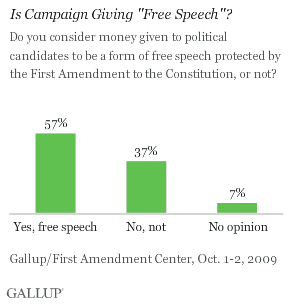
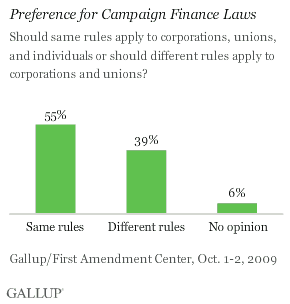
The free-speech question elicits uncommon agreement across party lines. More than 6 in 10 Republicans and Democrats believe campaign donations are a protected form of free speech, but fewer than half of independents (48%) agree.
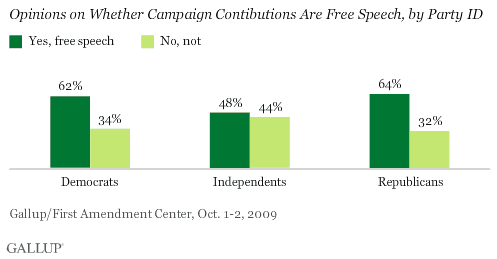
Public attitudes about the issues involved in the court's Citizens United v. Federal Election Commission decision come from a nationwide Gallup survey sponsored by the nonpartisan First Amendment Center. The poll was conducted Oct. 1-2, 2009, shortly after the high court heard concluding arguments in the case.
Americans Favor Limits on Contributions
While corporations and unions are still barred under a 1907 law from making donations directly to federal candidates, the court's decision Thursday allows organizations to run ads in direct support of or opposition to specific candidates; it also overturns 2002 McCain-Feingold restrictions on how close to elections corporate-sponsored ads can run.
"More specifically, 61% of Americans think the government should be able to limit the amount of money individuals can contribute to candidates and 76% think it should be able to limit the amount corporations or unions can give."
The 5-4 decision in the Citizens United case underscores the tension between protecting free speech and giving certain groups or individuals undue influence over election campaigns. Another poll question asked Americans to weigh the two considerations and say which is the greater priority for them: placing limits on how much individuals, corporations, and unions can contribute to campaigns or protecting the rights of these groups to freely support political campaigns. By 52% to 41%, Americans say placing limits on contributions is paramount for them.
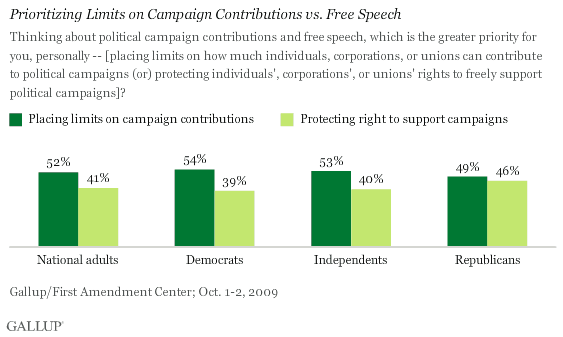
More specifically, 61% of Americans think the government should be able to limit the amount of money individuals can contribute to candidates and 76% think it should be able to limit the amount corporations or unions can give.
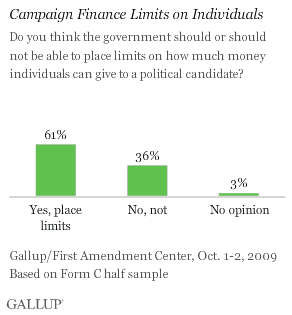
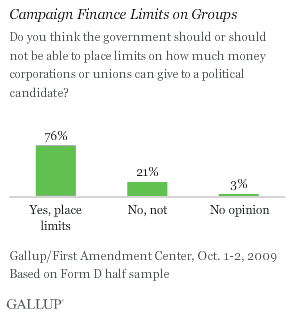
Thus, it would appear that, regardless of Americans' support for the principle that campaign donations are a form of political speech, and that corporations and unions should get the same treatment as individuals, they are likely to have significant concerns about the practical effect of the court's ruling, that is, more corporate and union money being poured into elections.
Bottom Line
Prior to now, while corporations and unions could run issue-based ads, they could not spend a penny on candidates, except through political action committees. Now that they can run such ads, the country could be in store for major changes in the way campaigns are conducted. Does the ruling square with Americans' views on campaign contribution limits? In some respects, yes. In others, it depends on whether Americans decide that independent expenditures are tantamount to political "contributions" or are merely free speech.
Survey Methods
Results are based on telephone interviews with 1,023 national adults, aged 18 and older, conducted Oct. 1-2, 2009, as part of Gallup Daily tracking. For results based on the total sample of national adults, one can say with 95% confidence that the maximum margin of sampling error is ±4 percentage points.
For results for the sample based on 535 national adults in Form C and 488 national adults in Form D, the margin of error is ±5 percentage points.
Interviews are conducted with respondents on land-line telephones and cellular phones.
In addition to sampling error, question wording and practical difficulties in conducting surveys can introduce error or bias into the findings of public opinion polls.
